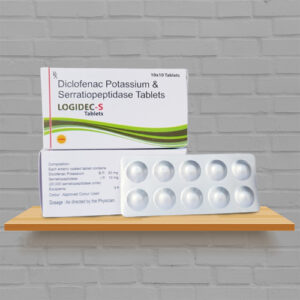Description
Tramadol Hydrochloride and Paracetamol (PCM) tablets are a combination analgesic supplied under the brand name FAMATOS P, used for the management of moderate to severe pain. Tramadol is an opioid analgesic that works by binding to μ-opioid receptors and inhibiting the reuptake of serotonin and norepinephrine, providing central pain relief, while paracetamol (acetaminophen) acts as a non-opioid analgesic and antipyretic by inhibiting prostaglandin synthesis in the central nervous system. This combination enhances pain relief through synergistic mechanisms while allowing lower doses of each component, reducing the risk of side effects.
These tablets come in the dosage form of Tramadol Hydrochloride in 37.5 mg and PCM in 325 mg, which are manufactured and supplied by Apikos Pharma. These tablets are produced in compliance with ethical quality standards. They serve these tablets all over the country to provide good health and well-being. Contact Apikos Pharma for the best PCD pharma franchise business opportunities in PAN India.
Benefits of Tramadol Hydrochloride and PCM Tablets
Tramadol Hydrochloride and PCM tablets have various medical advantages, given below:
- Provides effective relief from moderate to severe pain.
- Combines two pain-relieving mechanisms for enhanced effect.
- Allows lower doses of each drug, reducing side effects.
- Tramadol acts on opioid receptors and boosts serotonin/norepinephrine.
- Paracetamol (PCM) adds antipyretic (fever-reducing) benefits.
- Useful for post-surgical, musculoskeletal, and chronic pain.
- Faster and more potent pain relief than single-ingredient drugs.
- Can be prescribed for short-term acute pain management.
- Tramadol has a lower addiction risk compared to stronger opioids.
- PCM helps reduce inflammation-related pain and fever.
- Available in fixed-dose combinations for convenience.
- Can be an alternative when NSAIDs are not suitable.
Dosage Instructions for Tramadol Hydrochloride and PCM Tablets
The directions for using Tramadol Hydrochloride and PCM tablets are mentioned below:
- Take as prescribed by your doctor; do not self-adjust the dose.
- Typically taken every 4-6 hours as needed for pain.
- The maximum daily dose should not exceed 4 tablets.
- Swallow the tablet whole with water; do not crush or chew.
- It can be taken with or without food, but food may reduce nausea.
- If a dose is missed, take it as soon as remembered unless close to the next dose.
- Stop use and consult a doctor if pain persists beyond the recommended duration.
Storage Instructions for Tramadol Hydrochloride and PCM Tablets
The storage rules for Tramadol Hydrochloride and PCM tablets are given below:
- Keep it at room temperature.
- Keep it in a cool and dry place.
- Protect it from sunlight.
- Keep it away from the reach of children and pets.
- Do not keep it in moisture.
- Keep it away from freezing.
Precautions for Using Tramadol Hydrochloride and PCM Tablets
The safety measures for using Tramadol Hydrochloride and PCM tablets are:
- Avoid alcohol to prevent liver damage and increased drowsiness.
- Do not drive or operate machinery as it may cause dizziness or drowsiness.
- Consult a doctor before use if you have liver or kidney disease.
- Inform your doctor if you have a history of seizures or epilepsy.
- Not recommended for patients with asthma or breathing disorders.
- Do not take with other medicines containing paracetamol to avoid overdose.
- Use with caution in elderly patients due to a higher risk of side effects.
- Avoid prolonged use to prevent dependence or tolerance to tramadol.
- Do not take if allergic to tramadol, paracetamol, or other opioids.
- Inform your doctor if you are pregnant, planning pregnancy, or breastfeeding.
- Monitor for signs of serotonin syndrome.
- Do not combine with other medications without any medical advice.
- Seek immediate medical help in case of overdose.
Side Effects of Having Tramadol Hydrochloride and PCM Tablets
The side effects of consuming Tramadol Hydrochloride and PCM tablets are given below:
- Nausea
- Vomiting
- Constipation
- Dizziness
- Dryness in mouth
- Sleepiness
- Diarrhea
- Abdominal pain
- Dyspepsia




